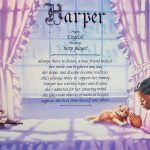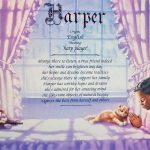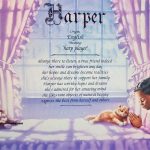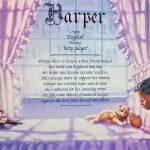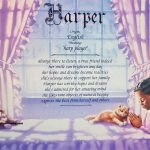The name Harper originated as an English occupational surname for a harp player or maker. Harper is an English occupational surname with a unique origin and meaning.
Derived from the Middle English word “harpere,” the name originally referred to someone who played the harp or crafted harps. As an occupational surname, it denoted a person’s profession, indicating their involvement with harps. Over time, this surname developed into a popular given name and has since gained widespread usage.
The name Harper is now commonly used as both a first name and a surname, with variants found in different cultures around the world. Its musical connotation and literary associations have further contributed to its popularity in recent years. Exuding charm and musicality, Harper remains a beloved name choice for parents seeking a unique but meaningful moniker for their children.
A Brief History Of Surnames
Surnames were not commonly used until the Middle Ages, as societies began to grow and individuals needed a way to be identified. The use of surnames originated from various sources, including occupation, location, and personal characteristics. This system helped distinguish people with similar given names and evolved over time.
In the case of the surname Harper, it derives from the Old English word “harpere,” which means harpist or minstrel. This suggests that the name was originally given to individuals who played the harp or entertained gatherings with music. As time went on, these individuals passed down their names to future generations, solidifying the surname.
The evolution of surnames is an intriguing study, as it reflects the societal changes and cultural influences from different regions. Understanding the origins of surnames provides insights into our ancestors’ lives and the roles they played in their communities.
The Meaning And Significance Of Harper
Harper, a popular name today, has its roots in English and Scottish surnames. Its significance lies in its association with harp playing, music, and poetry, making it a name tied to artistic and creative qualities.
The name Harper has a rich historical context and holds significant meaning and symbolism. This name originates from the Old English word “harpere,” which means “harper” or “player of the harp.” Historically, harpers were highly respected musicians who played the harp, a noble instrument associated with prestige and talent. In medieval times, harpers entertained kings and nobles with their musical abilities, often seen as a symbol of sophistication and culture. The name Harper gained popularity as a surname before transitioning into a given name. Today, Harper is a unisex name, representing strength, creativity, and musicality. It embodies a connection to the arts and the power of expression. As a name, Harper has a modern and unique appeal, capturing a sense of individuality and artistic flair.Geographical Distribution And Popularity
The name Harper has gained popularity as both a surname and a given name worldwide. As a surname, Harper is found in various parts of the world, with a significant presence in English-speaking countries such as the United States, Canada, and the United Kingdom. It is believed to have originated from the occupation of a harper, a harp player in medieval times.
Harper as a given name has gained significant popularity in recent years, particularly for girls. The name has a strong, confident sound to it, which may explain its rise in popularity. Famous individuals with the name Harper include Harper Lee, the renowned author of “To Kill a Mockingbird,” and Harper Beckham, the daughter of iconic footballer David Beckham and fashion designer Victoria Beckham.
Possible Origins And Origins
There are several different theories on the origin of the name Harper. Historical evidence and linguistic analysis have provided some insights into its origins. One theory suggests that the name originated from the Old English word “hearpere,” which refers to a person who plays the harp. Another theory suggests a Scottish origin, derived from the Gaelic word “àrd-bard,” which means “high poet” or “chief poet.” Some believe that it could have been derived from the occupation of someone who harped on strings or made harps.
However, it is important to note that the exact origin of the name Harper remains uncertain. Different families and lineages may have their own unique beginnings for the name. Research and exploration into genealogical records may provide further insights into the specific origins of individuals named Harper.
Harper As A Gender-neutral Name
The name Harper has gained popularity in recent years as a gender-neutral choice. In a society that is becoming increasingly aware of gender fluidity and non-binary identities, traditional gender-specific names are being reevaluated. Harper is a prime example, as it is commonly used for both boys and girls.
Gender-neutral names have seen a rise in popularity worldwide, not just for children but also for adults seeking to express their identity. This shift is influenced by a growing acceptance and understanding of gender diversity in our society.
Harper’s rise as a gender-neutral name can also be attributed to its associations with influential figures such as Harper Lee, the author of “To Kill a Mockingbird.” These associations help create a positive image and contribute to its appeal as a choice for all genders.
Harper In Literature And Media
The name Harper has roots in both literature and media, with its origins dating back to the Old English term “hearpere,” meaning harpist or musician. This name has gained popularity in recent times, often associated with strong, creative characters in books, films, and television shows.
Harper has become a popular character name in literature, with its usage dating back to the mid-1800s. A notable example is the character Scout Finch from To Kill a Mockingbird, whose full name is Jean Louise Finch but is commonly referred to as Scout or Harper. The name has also been used in other literary works, symbolizing strength and independence. In popular culture, Harpers are often portrayed as intelligent, determined, and courageous individuals. They often serve as the protagonists, demonstrating their impact and influence on the perception of the name. The portrayal of Harpers in literature and media has contributed to its rising popularity, with many parents choosing the name for their children. The positive traits associated with the name further add to its appeal, making it a desirable choice for many families. The name Harper continues to gain recognition and admiration, solidifying its place in both literature and everyday life.The Modern Appeal Of Harper
Harper, a name with modern appeal, has origins rooted in English and Scottish culture. Its popularity has soared in recent years, thanks to its association with successful figures like Harper Lee and Harper Beckham. So, where did the name Harper come from?
It derives from the Middle English word “harpere,” meaning a harpist or minstrel, which exemplifies its musical and artistic connotations.
Harper has emerged as a popular name choice in recent years, gaining significant contemporary appeal. Its rise in popularity can be attributed to a combination of factors.
Firstly, the name Harper has a strong and bold sound, making it both memorable and distinctive. Its simplicity adds to its modern appeal, as many parents are opting for names that are both trendy and easy to pronounce.
Celebrities and public figures have also played a significant role in popularizing the name Harper. For instance, the renowned author Harper Lee, author of the classic novel “To Kill a Mockingbird,” has had a lasting impact on the name’s popularity.
In addition, famous personalities like Victoria and David Beckham who named their daughter Harper, have further contributed to its appeal. Seeing their favorite celebrities choosing the name Harper encourages many parents to consider it for their own children.
All these factors combined have made the name Harper a modern and sought-after choice for parents looking for a name that embodies style, individuality, and a touch of celebrity influence.

Credit: www.etsy.com
Conclusion Of The Name Harper
The name Harper has seen a remarkable surge in popularity in recent years. This can be attributed to its historical connections and modern appeal. Initially derived from the Old English word “harpere,” meaning “harp player,” the name Harper was traditionally linked to musicians and poets. However, its meaning soon evolved to encompass skilled craftsmen who built and repaired harps. This association with talent and craftsmanship likely contributed to its enduring popularity.
In modern times, the name has gained widespread recognition thanks to prominent figures bearing the name, such as the renowned American author Harper Lee. Celebrities also play a significant role in popularizing names, and the choice of Harper for their children by famous personalities like David and Victoria Beckham has undoubtedly elevated its status.
Furthermore, the unisex nature of the name Harper has broadened its appeal, appealing to parents seeking gender-neutral options. It encompasses strength, creativity, and a sense of individuality, making it an attractive choice. Overall, the name Harper’s rich history, modern associations, and versatile qualities have solidified its position as a beloved name in today’s society.
Frequently Asked Questions On Where Did The Name Harper Come From
Where Did The Name Harper Come From?
The name “Harper” originated from the Old English word “hearpere,” which means “harp player. ” It was commonly used as a surname for individuals who played the harp during medieval times. Over the years, it gradually transitioned into a popular given name for both boys and girls.
Conclusion
The origins and meaning behind the name Harper have been revealed, shedding light on its rich history. With roots stemming from Old English, this name originally referred to someone who played the harp. As times changed, Harper became a popular gender-neutral name, embodying strength and creativity.
Understanding the significance of a name can create a deeper connection to our own identities and family roots. Now, when you hear the name Harper, you’ll have a better appreciation for its timeless charm.


